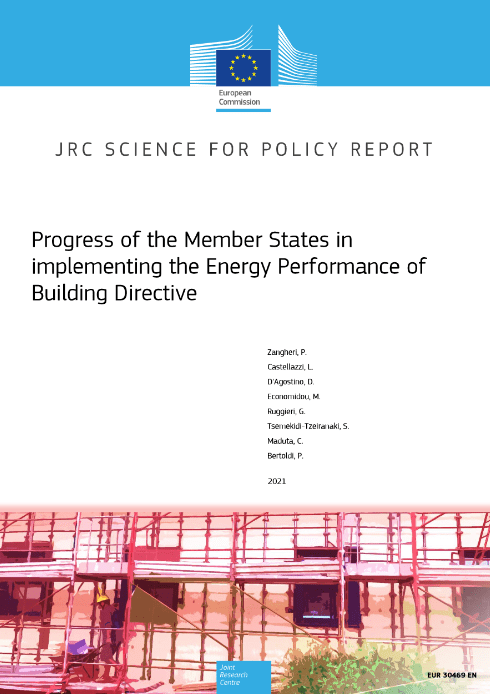
Resumen:El estudio indica que durante el periodo 2005-2018, el consumo de energía final del sector de la construcción disminuyó un 5%. En el sector residencial, las mejoras en la eficiencia energética, así como los inviernos más cálidos, han dado lugar a una reducción del 10% en el consumo de energía final, mientras que en el sector de los servicios, el consumo de energía final aumentó un 2% debido principalmente al crecimiento económico. Sin embargo, la tasa de renovación sigue siendo muy baja. En el caso de los edificios residenciales, la tasa de renovación energética anual ponderada se estimó en un 1,0%, mientras que la tasa de renovación profunda es mucho menor, con valores en torno al 0,2%. El examen de la aplicación de los requisitos mínimos de rendimiento energético óptimos en función de los costes indica que todos los Estados miembros aplicaron los requisitos de la DEEE.
Summary:The study indicates that during the period 2005-2018, the final energy consumption of the building sector decreased by 5%. In the residential sector, improvements in energy efficiency as well as warmer winters have led to a 10% reduction in the final energy consumption while in the services sector, the final energy consumption increased by 2% mainly due to economic growth. However, the renovation rate is still very low. For residential buildings, the annual weighted energy renovation rate was estimated to 1.0% while the rate of deep renovation is much lower with values around 0.2%. The review on the implementation of cost-optimal minimum energy performance requirements indicates that all Member States implemented the EPBD requirements.
Fecha publicación: 02-08-2021
Autor: Centro Común de Investigación; Economidou, Marina ; Zangheri, Paolo ; D'Agostino, Delia ; Maduta, Carmen ; Tsemekidi-Tzeiranaki, Sofia ; Bertoldi, Paolo ; Castellazzi, Luca ; Ruggieri, Gianluca
ISBN / ISSN: 978-92-76-25200-9 / 1831-9424
Link: https://bit.ly/3ukTZ4V
Palabras clave: ahorro de energía , aislamiento térmico , calefacción , consumo de energía , directiva (UE) , edificio , Estado miembro UE , informe , norma medioambiental , norma técnica , red de energía , rendimiento energético , técnica de construcción
Keywords: energy savings , energy consumption , energy efficiency , energy standard , environmental standard , energy consumption , energy efficiency , building technology , EU Member State , report , energy consumption , environmental standard , heating , energy efficiency , building technology , environmental standard , energy consumption , environmental standard , energy network , environmental standard , environmental report
- Saltar a la navegación principal
- Saltar al contenido principal
- Saltar a la barra lateral principal
- Saltar al pie de página

CDE Almería - Centro de Documentación Europea - Universidad de Almería
Centro de Documentación Europea de la Universidad de Almería